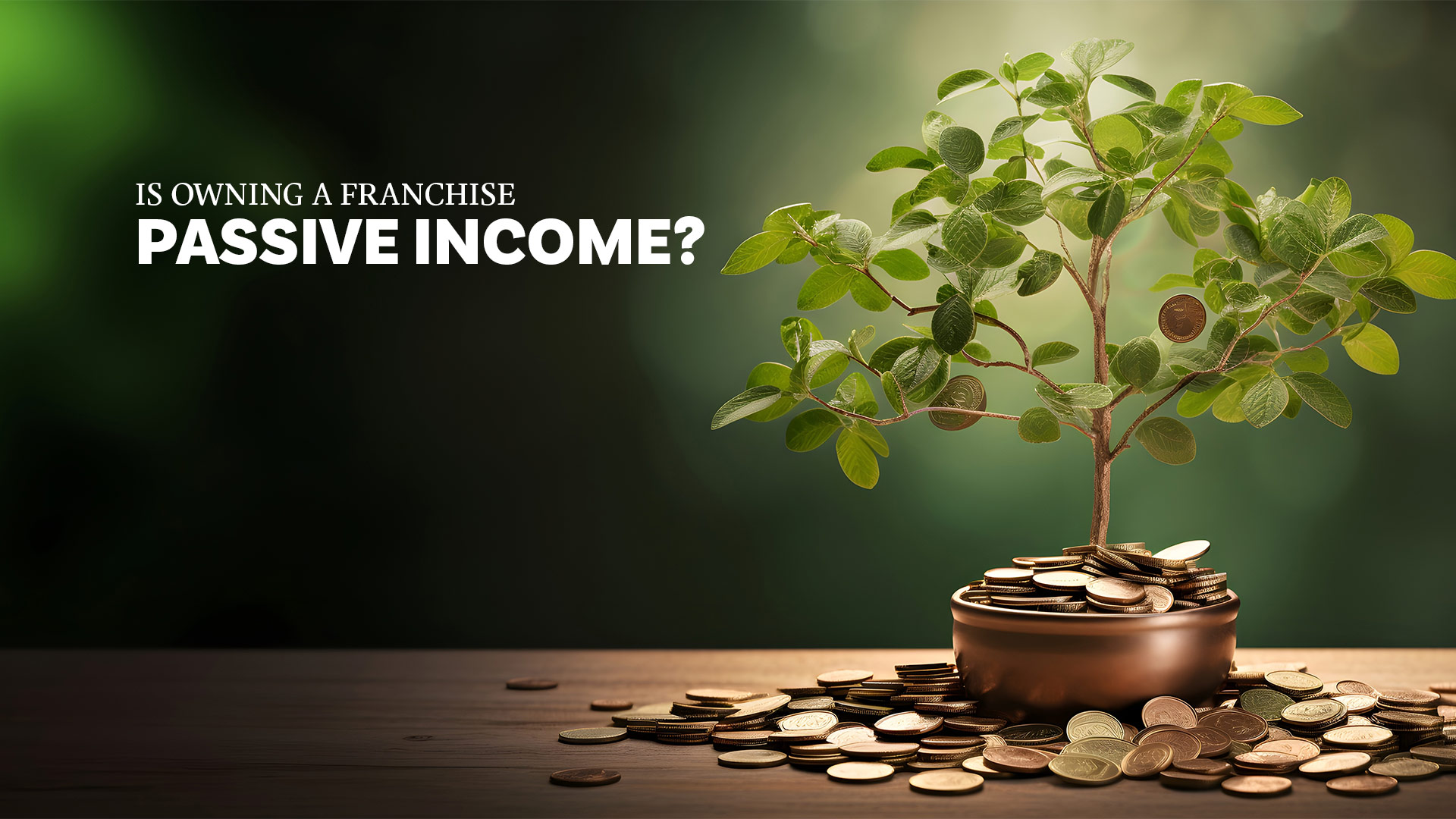How appealing is the thought of not only becoming a business owner but also earning money while your business runs itself? Aka, passive income.
For some of you exploring entrepreneurship through franchising, the idea of passive franchising represents the dream—a way to achieve business success with minimal day-to-day involvement.
However, if you’re wondering “Is owning a franchise passive income?” the answer is usually NO – unless you own a business with a passive franchise model. And the truth of passive franchising is that it’s not only quite expensive – it might not be the right fit for you.
The world of franchising is vast, and the term “passive” can often be misunderstood. It’s crucial to peel back the layers and research the various franchise models available, ensuring you choose an opportunity that aligns with your expectations, lifestyle, and financial goals.
This article is designed to guide you through the intricacies of passive franchising, offering clarity and insight into what it genuinely means to own this type of business.
Keep Reading to Learn About:
- What is Franchising: Understanding the franchise model, how common it is, and how you’re supported as a franchisee.
- The Reality of Passive Franchises: Unpacking the concept and setting realistic expectations.
- Different Franchise Business Models: Exploring passive, semi-passive, manage-the-manager, and owner-operator models.
- Choosing the Right Model for You: Insights into matching your goals with the appropriate franchise model.
- The Role of Franchise Brokers: How working with a broker can align your aspirations with the ideal franchise opportunity.
- The Investment in Passive Franchising: Understanding the financial commitment required for truly passive opportunities.
But before we get into it, let’s quickly cover a few Franchise fundamentals.
Franchising 101: What is it?
At the heart of every entrepreneur is a spirit of creating, innovating, and navigating the path to business success.
For startup business owners, this spirit can sometimes flicker out due to its high risk and high reward nature. And though it appeals to many, it’s not the only way to achieve your business goals.
Enter franchising—a strategic alternative that combines the thrill of business ownership with the stability of a proven model.
Franchising offers a unique opportunity to partner with an established brand, leveraging a business model that has been meticulously developed and tested over time. This partnership allows you to operate under a recognized brand, bringing with it a suite of advantages, from operational systems to marketing support. It’s a collaborative effort where both the franchisee (that’s you–hopefully) and the franchisor work towards mutual growth, focusing on expanding the brand and increasing revenue.
Win, win.
Franchising 101: How Common is it?
Franchising is more common than you might think, with its presence felt across various industries, from restaurants and retail to services that are part of our daily lives. This widespread adoption speaks to the model’s effectiveness and appeal.
For those new to the concept, here’s a breakdown of how it works:
- Initial Fee and Investment: To embark on this journey, franchisees pay an initial fee to gain the rights to operate under the franchisor’s brand. This fee covers the cost of training, support, and access to the brand’s established systems.
- Ongoing Support: Beyond the initial investment, franchisees benefit from ongoing support from the franchisor. This includes marketing, operational guidance, and sometimes, assistance in site selection and setup.
- Adherence to a Proven Model: One of the critical aspects of franchising is the adherence to the franchisor’s business model. This model outlines the operational standards, service quality, and customer experience that have been key to the brand’s success.
Franchising 101: Why Choose this Path?
Franchising stands out for several reasons, offering a pathway to business ownership that mitigates many risks associated with startups. Here are a few compelling benefits:
- Quicker Path to Launch: With a franchise, much of the groundwork has been laid out, from brand recognition to operational procedures, allowing you to hit the ground running.
- Supportive Community: Franchising fosters a network of franchisees who share experiences, challenges, and successes, creating a community of support.
- Leverage Your Talents: This model allows you to focus on what you do best, whether it’s sales, management, or customer service, by providing a structure within which to operate.
In Business for Yourself, Not by Yourself
The essence of franchising is beautifully captured in the phrase, “In business for yourself, but not by yourself.” And it’s this balance of independence and support that makes franchising an attractive option for many aspiring business owners.
By choosing this route, you’re investing in a partnership that aims for success through a shared vision and proven strategies.
As we explore the nuances of passive franchising and other models within this framework, remember that franchising offers a solid foundation on which to build your entrepreneurial dreams – and there’s options for everyone!
Whether you’re seeking a more hands-off investment or an opportunity to be actively involved in day-to-day operations, understanding the franchise model is your first step towards making an informed decision.
To get an idea on the best Hands-off (passive franchises) to invest in, read this article:
7 additional resources you can read to propel your research process:
- Thinking of Becoming a Business Owner? Here’s a Breakdown of What to Consider.
- Can You Purchase Franchises Under 50k? The Answer’s Not That Simple.
- Calling All Entrepreneurs Who Want to Franchise…This is Your Comprehensive Guide to Owning a Business
- If You Believe These 10 Franchise Myths, You May be a Misinformed Buyer
- How to Find Out if a Brand is a Franchise or Not
- Which Industries are Most Likely to Franchise?
- What is the Failure Rate for a Franchise?
Understanding Ownership Models in Franchising
Buying a business in this industry requires a deep understanding of the different ownership models available.
Each franchise model offers a unique blend of involvement, investment, and potential rewards, making it crucial to select the one that aligns best with you.
Let’s first explore the distinctions between passive and semi-passive franchising.
Passive vs. Semi-Passive Franchising
Passive Ownership:
With passive franchising, owners invest in the franchise without taking part in daily operations.
This model is ideal for those looking to earn income from their investment while dedicating their time to other pursuits. Passive owners rely on a management team to run the business, making strategic decisions without involving themselves in the day-to-day. The financial implications include a significant upfront investment to establish the franchise and secure a competent team, with operational implications resting on the ability to monitor and guide from a distance.
Semi-Passive Ownership:
Semi-passive franchising strikes a balance between personal involvement and delegation. Owners in this model are typically involved in strategic decisions and may engage in some aspects of the business’s operations, but they do not manage the day-to-day activities. This model suits individuals who wish to play a role in their business without it consuming all their time, allowing them to maintain another job or personal commitments.
Exploring Other Models of Franchise Ownership
Manage the Manager:
This model is a variation of semi-passive ownership where the franchise owner’s primary role is to oversee a manager or management team responsible for the daily operations. It’s an appealing option for those who prefer to focus on big-picture aspects of the business, such as growth strategies and financial planning, leaving the operational details to their trusted manager.
Owner-Operator:
At the other end of the spectrum lies the owner-operator model, where the owner is deeply involved in every aspect of the business. This model demands more commitment of time and energy, with owners often working full-time within the franchise. It’s suited for individuals who desire a hands-on approach, seeking to directly influence customer experience, staff management, and daily operations.
Aligning Your Goals with the Right Model
Each franchising model presents its own set of challenges and rewards, making it essential to reflect on what you hope to achieve through franchise ownership. Consider your willingness to be involved in day-to-day operations, your financial capacity for investment, and how you envision your role as a franchise owner.
To start, ask yourself these questions:
- Are you looking for an investment that allows you to earn while focusing on other projects or interests?
- Do you want to be involved in your business but not tied down by daily operational tasks?
- Or do you thrive on being at the forefront of your business, directly managing operations and leading your team?
Understanding where you stand on these questions will help guide you towards the franchising model that truly aligns with your goals. Whether you lean towards the autonomy of passive ownership, the balanced involvement of semi-passive or manage-the-manager models, or the hands-on approach of owner-operator, selecting the right path is critical to your success and satisfaction as a franchise owner.
Discover Your Franchise Fit with Zorakle
With numerous franchising models available, how do you determine which path aligns best with your aspirations?
This is where Zorakle comes in – a dynamic Entrepreneurial Assessment tool designed to illuminate your ideal franchising journey.
How It Works
Through a series of targeted questions, Zorakle evaluates your preferences, financial goals, and desired level of involvement and then provides personalized insights that match you with franchising models that suit your entrepreneurial profile.
In doing this, you’ll not only have insights for yourself on what opportunities align best with you, but if you choose to work with a Franchise Broker, they will have a targeted strategy to match you with the best franchise for you.
Ready to find out your business owner type? YES, I want to take the FREE Entrepreneurial Assessment!
The Value of a Franchise Broker in This Process
While tools like Zorakle can significantly clarify your franchising path, partnering with a Franchise Broker can further enhance your experience finding the right franchise opportunity.
FBA Franchise Brokers specialize in ethically matching prospective owners with franchises that align with their goals, lifestyle, and investment level.
Why Work with a Franchise Broker?
- Personalized Guidance: Franchise Brokers offer tailored advice based on your unique profile, taking into account the insights gained from assessments like Zorakle.
- Industry Expertise: With extensive knowledge of the franchising landscape, Brokers can introduce you to opportunities you may not have discovered on your own.
- Negotiation Support: They can assist in the financial aspect of your franchise agreement, pointing you in the right direction with acquiring loans, and ensuring you enter into a partnership with clear expectations and favorable conditions.
- Risk Mitigation: By vetting franchises and highlighting the pros and cons of each opportunity, Brokers help reduce the risk of investing in a business that doesn’t meet your needs.
Interested in connecting with a Broker who will assist you in finding a GOOD Franchise? Book time today.
Understanding the Investment: The Costs of Passive Franchising
If you’re set on passive franchising, here’s a breakdown of the costs associated with this type of model.
A crucial aspect of considering passive franchising as your entrepreneurial path is understanding the financial commitment involved. Passive franchises often appeal due to their potential for generating income with minimal daily involvement. However, this convenience and autonomy come with a price tag that prospective franchisees must be prepared for.
Initial Investment and Ongoing Costs
- Higher Entry Costs: Passive franchises typically require a more substantial initial investment compared to more hands-on models. This is due to the established systems, brand reputation, and the cost of hiring a management team to operate the business.
- Ongoing Operational Expenses: Beyond the initial fee, passive franchise owners must account for ongoing expenses, including royalties, marketing fees, and salaries for management staff. These costs are part of ensuring the franchise runs smoothly and continues to grow.
Evaluating Financial Viability
Before full investing in this business opportunity, it’s essential to:
- Assess your financial resources: Ensure you have the capital required not just to start, but to sustain the business until it becomes profitable.
- Understand the financial model: Familiarize yourself with the franchise’s revenue streams and operational costs to gauge potential profitability. (FBA Brokers help you do this, at no cost.)
- Consider long-term financial goals: Reflect on how this investment fits into your broader financial plans and whether it aligns with your income expectations.
The Rewards of Investment
While the financial barriers to entry can be high, the potential returns on a passive franchise investment can be significant. With the right franchise choice, market conditions, and management team, passive franchise owners can enjoy a steady income stream, contributing to long-term wealth and financial security.
Finding Your Place in the Franchise World
As we wrap this up, we hope it’s clear how franchising offers a pathway for every aspiring entrepreneur, whether you’re drawn to the allure of passive income or the hands-on satisfaction of active management.
The dream of making money and thriving in business is universal, yet the routes to achieve it are as diverse as the individuals pursuing them.
However–in franchising, there’s respect for every onramp to business ownership. The perfect franchise match for YOU awaits.
Are you ready to align with your vision of making money and a difference?
Let’s find your franchise together. Find the best franchise opportunity for you: https://www.franchiseba.com/find-franchises/



